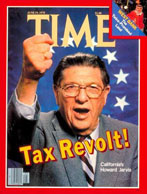Question
What did Proposition 13 do exactly, and just how high were property taxes before it passed?
John Myers
The 1978 initiative was based largely on a campaign about escalating property taxes, but it made major changes that have had ripple effects through all sectors of government.
Prop 13 set the base property tax rate throughout California at 1% of a property's value. For property that hasn't changed hands since 1978, the tax-assessed value remains the same. Prop 13 only allows a revaluation of property once it's sold, which explains why some people pay higher property taxes than others who have almost the exact same home. The nonpartisan Legislative Analyst's Office has reported that before Prop 13, the average statewide property tax was 2.67%, which means the drop to 1% was pretty noticeable.
Prop 13 also caps the annual increase in property taxes at 2%.
It's important to note that Prop 13's limits apply to all property, both residential and commercial. And that's been a source of debate through the years, as some have argued that voters approved Prop 13 to protect their homes, not company and corporate buildings. As such, that's why some continue to believe Prop 13 should be amended to apply only to residential property, thus allowing higher property taxes on commercial/business property.
But that's not all Prop 13 did. It also raised the requirement for new taxes -- both locally and from the Legislature -- requiring a supermajority (2/3) of either voters or legislators.
Question
Who was against it and who was for it? And who exactly was Howard Jarvis?
John Myers
Prop 13 was written by two men: Howard Jarvis, an apartment- building owner in Los Angeles, and Paul Gann, an anti-tax crusader in Sacramento. But it was the curmudgeonly Jarvis who became the folk hero during the Prop 13 campaign, tapping into a popular resentment and worry about property tax rates.
The fundamental question, as many have written, wasn't whether property tax rates should be lowered, but how? Gov. Jerry Brown and the Legislature, widely criticized for acting too slowly to address concerns around the state about property taxes, hurriedly put an alternative measure on the June 1978 ballot -- arguing Prop 13 was the wrong fix. But by the time lawmakers got involved, the popular uprising was simply too strong to stop.
Question
Was there a lawsuit?
John Myers
There have been several legal challenges to Prop 13, mostly focused on whether it properly changed the state constitution. Initiatives (measures placed on the ballot by voter signatures) can only deal with one change to the constitution -- and not multiple changes. But the California Supreme Court has ruled that Prop 13 is legit, and so it remains in full effect.
Question
What were the implications of the loss of that property tax revenue?
John Myers
The property tax revenues that disappeared under Prop 13 meant less money for schools, fire, police, etc. And here's where a big decision shaped what we now live with today: state leaders, including then/now Gov. Brown, agreed to replace the former local dollars with state tax dollars, thus leading to the state subsidizing/paying for much of what happens on the local level.
Question
So is Prop 13 the "original sin" of California budget woes?
John Myers
Prop 13 has both supporters and critics, so it's hard to objectively call it a "sin." But it did have a dramatic impact, especially through the years, on the state budget.
It also had another, perhaps unintended, consequence that's been pointed out by Joe Mathews and Mark Paul in their book "California Crackup": it transferred a lot of political power (which follows the money) away from local communities and toward Sacramento.
Question
Was Proposition 13 a harbinger of the ascent of Ronald Reagan and Reaganomics?
John Myers
Ronald Reagan, who was a fiscal conservative as governor (1966-1974), was likely able to ride some of the anti-tax anger into a national political victory in 1980. Keep in mind that Prop 13 spawned other efforts in other states, many of them led by Howard Jarvis, who saw the victory as one which would change the nation.
Question
How sacrosanct is Proposition 13 in the state? Is it the third rail of California politics?
John Myers
Virtually no one opposes Prop 13's cap on residential property taxes, though there are some interesting academic and economic theories about what impact that might have had through the years on property values.
Where Prop 13 has remained controversial is in its coverage of commercial property, and its imposition of the 2/3 tax vote in Sacramento.
Question
Anti-tax groups seem pretty vigilant about protecting Proposition 13...
John Myers
It does have its protectors -- most notably, the Howard Jarvis Taxpayers Association -- and much of the fighting is over tax increases of all kinds. Prop 13 is also the most recognizable "brand" in California politics, which makes its many provisions a real political landmine to change... should someone want to.
